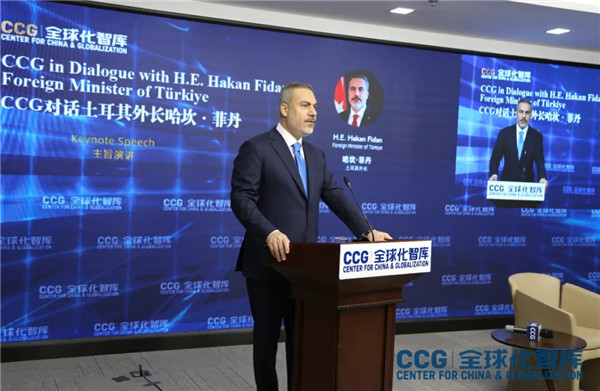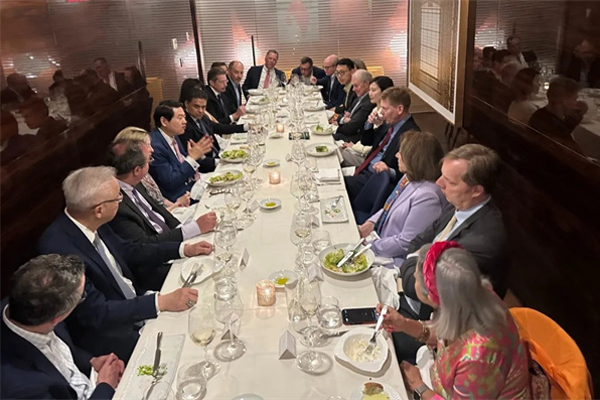CCG hosts sub-session on global talent governance at the second Paris Peace Forum
From November 11 to 13, nearly a hundred government delegations and over 30 government leaders gathered at the second Paris Peace Forum, including the UN Secretary-General Antonio Guterres, EU Commission President Ursula Gertrud von der Leyen, French President Emmanuel Macron and Chinese Vice President Wang Qishan. This forum saw more than 80 sessions that covered six major cross-sector issues, attracting over 6,000 attendees.
The Center for China and Globalization (CCG), joining the forum for the second time this year, successfully held a sub-session to discuss the initiative of launching an alliance of global talent organizations. The session was also broadcast for a global audience.
The Paris Peace Forum, initiated by French President Macron and supported by many international organizations, thinktank scholars, experts, and media outlets, is a high-level platform for the discussion of global governance issues. The goal is to push forward multilateral cooperation to address global challenges.
The first forum last year enjoyed the presence of global leaders such as German Chancellor Angela Merkel and Russian President Vladimir Putin. In October, Chinese President Xi Jinping, in a call to President Macron, also voiced China’s support for the second Paris Peace Forum in joint efforts to safeguard multilateralism and solve global challenges. This year’s forum saw a consensus that global governance is facing a mounting crisis, and that NGOs and civil society should be allowed to play a more active role in the resolution of global issues like population growth, climate change and technology disruption.
Based on its research on global governance and talent globalization, CCG has proposed two initiatives at the first Paris Peace Forum, namely establishing an alliance of international talent organizations and creating an international e-commerce alliance (“D50”). These proposals were selected from nearly 900 submitted proposals to be presented at the first forum. The first initiative aims at filling the gap in global talent governance by having national and local governments, international organizations, business leaders, and experts work together to address the problems related to global talent mobility. In the past year, several rounds of discussion have been held to map out the steps of turning this initiative into reality.
There has seen a surging demand for technical talent as new technologies like big data and AI advance and global market competition becomes fiercer. However, the relative lack of talent and human capital mobility has triggered worldwide competition for talent. Differences between countries regarding visas rules, employment policies and welfare have constrained global talent growth and mobility, hindering global and regional development.
To gather more insights and suggestions on how to solve these problems, CCG held a sub-session during this year’s forum titled “Brain Drain: Making Better Use of the World’s Talent.” The session aimed to look into the details of how to prepare and pool resources to set up an alliance of global talent organizations. The session was led by CCG President Dr. Wang Huiyao and CCG Secretary General Miao Lu, joined by Martin Geiger, associate professor for global migration and mobility at Carleton University; Frank Laczko, director of the IOM’s Global Migration Data Analysis Centre; and Jean-Christophe Dumont, head of the International Migration Division in the OECD Directorate for Employment, Labour and Social Affairs.
Wang pointed out that global talent governance faces the same problem that occurs in many other areas of global governance like climate management, namely the lack of a multilateral mechanism to coordinate among national governments. Creation a global talent organization alliance composed of influential groups, institutions and bodies that share common interest would provide a platform to facilitate dialogue, policy coordination and cooperation. For instance, an information gathering and sharing center could be established to promote consensus on global talent cooperation.
The initiative reflects the new trends and demands of our changing global situation and could open a new page for global governance. Since it was proposed last year, the initiative has gained support from international society and preparation is well under way for it to be launched sometime next year.
Miao highlighted three major barriers to global talent mobility, which are the lack of international consensus on promoting global talent exchange and cooperation; lack of a multilateral cooperative mechanism to facilitate global talent recruitment; and the ongoing China-US trade conflict. Negative impacts from these barriers has extended to various fields such as science, technology and international education. Miao also called for more efforts to encourage women to take on leadership roles and enforce gender equality principles in the workplace.
Meanwhile, as the only Chinese member of the Paris Peace Forum steering committee, Dr. Wang attended a board meeting on November 12 and provided suggestions on strengthening the role of the forum including various aspects like funding and human resources. Also, he briefed forum chairman and former WTO Secretary General Pascal Lamy on progress of the formation the alliance and presented him a copy of CCG’s recently-published English book “Handbook on China and Globalization.”
CCG also joined CECC in announcing an initiative on the Global Digital Economy Alliance and a three-year action plan to build it as platform for dialogue, communication, cooperation and development of the global digital economy.
LocationParis





